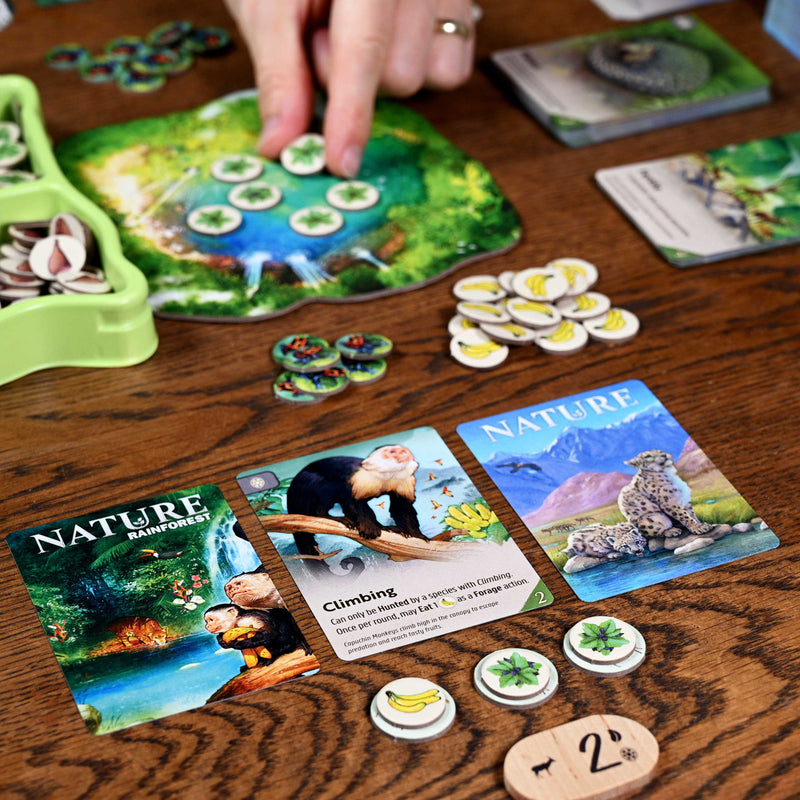This is the second post in a series about our upcoming game Paint the Roses, written by the game’s designer, Ben Goldman.
Ask any gamer what the biggest problem with cooperative games is, and they’ll tell you it’s quarterbacking.
Quarterbacking is when one player who knows the game well tells other players what to do on their turns, or even takes their turns for them.
That might sound jerky, but usually it's not. Rather, quarterbacking happens because it gives all players the best chance to win, and that’s what all the players want in a cooperative game. Cooperative games incentivize quarterbacking. Let us heed the wisdom of the ancient sage Ice-T: “Don’t hate the player. Hate the game.”

Quarterbacking is a problem for two reasons:
- When optimal play means players aren’t making decisions for themselves, it limits fun.
- If players don’t get a chance to be wrong, they don’t see what they could have done differently, so they don’t improve. Moreover, they’re not motivated to improve because their judgements don’t matter. This creates a vicious cycle where quarterbacking becomes entrenched, play after play, because the players don’t improve.

So how do you design a cooperative game to prevent quarterbacking? There are two general solutions:
Solution #1: Limit Communication
Here, the rules say you can only communicate in narrow, specified ways. A well-known example is Hanabi. In Hanabi, the only way you may communicate with another player is to give them a certain kind of clue. So, if you see another player biff, you can’t say anything about it.

I have two gripes with this solution:
- One of the greatest qualities of tabletop games is that they’re social. Strict communication limits make a game less social. They conflict with the medium.
- Many players struggle to honor strict communication limits. Facial expressions and body language communicate a lot of information, and many players have trouble controlling those things. So information slips out anyway. Sometimes you can prevent this by insisting players act like statues with poker faces, but that makes a game REALLY antisocial.
Thankfully, there’s another option:
Solution #2: Limit Information
Here, you limit what each player knows about the overall game state, by hiding lots of important information from them. An easy way to do this is to hide information in each player's private hand of cards. The more information each player is missing, the less effectively any player can quarterback, and the less you have to limit communication.
Great! If you do this, you can make a cooperative game social, but without lots of quarterbacking!
But most cooperation games don’t do this. Why not?
I don’t actually know. But I’m taking advantage: I’ve built a cooperative game called Paint the Roses around the principle of limiting information.
Paint the Roses

The first task was to figure out what kind of game it should be. What kind of game can work well when players lack information? Answer: a deduction game. The whole point of a deduction game is to challenge players to overcome ignorance.
So Paint the Roses would be a cooperative deduction game. Here’s how it works:
You’re a gardener who works for the Queen of Hearts in Wonderland. The Queen wants to behead you, but she needs an excuse: she needs you to make a mistake. So, rather than tell you how to plant her rose garden, she gives you a small clue about how to do it. She gives similar clues to the other gardeners, your teammates.
But: the queen won’t let the gardeners share what they know with each other. So the only way to deduce your teammates’ clues is to watch which rose bushes they plant, and where they plant them.
How Paint the Roses prevents quarterbacking but allows more table talk
In Paint the Roses, each player has a secret card, and you give information about your card by planting rose bushes in the garden. Each turn has 2 phases:
Tile Placement
Card Guessing
During Tile Placement, you place garden tiles based on your secret card. This leaves little room for quarterbacking. If you place a tile in a bad spot, the other players don’t know it’s bad, because they don’t know what’s on your card.

examples of secret cards
During Card Guessing, your team tries to deduce what’s on your card based on how you planted.
In this phase, all players can talk, except you. Here it’s possible for one player to talk more than others. Does that lead to quarterbacking? Not really.
If you know the game better than other players, you can bring that knowledge to the conversation. However:
- You don't know all the other player's secret cards. Because they all have information you don't, you can't just tell them what to guess.
- You know when it’s your turn to place a tile, you won’t be able to help your teammates guess your card. Therefore, when it’s your turn to talk, you’re incentivized to teach your teammates how to reason about the game, rather than decide for them.
In other words (the point I’m about to make is the reason I'm writing this article):
This scheme replaces the incentive to quarterback with an incentive to help your teammates understand how to play well.
It creates vivid, healthy table talk where everyone learns together, and everyone feels their collective understanding grow.
I’m proud of this. I think this is a way to turn cooperative games’ weakness into a strength. I hope you feel the same when you play it.
The game will launch on Kickstarter in 2020. If you want to be alerted to new blog posts and Kickstarter launch via email, sign up here.
Previous posts in the Paint the Roses series





@ Jeff
Thanks for commenting!
It is essentially inverted, Hanabi has a majority limit on communication and a minority limit on information, Roses has a majority limit on information and a minority limit on communication.
Those are all other ways to go about it, another that got mentioned to me a lot on facebook/reddit was time pressure (which I think ties into your 4th way.) The 3rd way needs to be tied to something else, alone it won’t prevent quarterbacking because even if only one play can effect the game state in a certain way, another player could still tell them what to do.
Sounds very intriguing and I’m interested in giving it a try. Co-op games have been sort of hit-or-miss with my family and fellow gamers. We generally don’t have a big quarterbacking problem because both my wife and I try really hard to scale back and let other players make decisions and we just help remind of rules or point out multiple possibilities. I do agree that eliminating all communication is not ideal. We didn’t really get into Hanabi…we enjoy Magic Maze and have fun banging the little “do something” stick but would rather just communicate.
Really looking forward to this on KS.
Another idea is handicapping someone that knows more than others. Let the one that knows more have a harder challenge somehow.
This sounds like an interesting solution, but I’m interested if the restriction that everyone can talk but you isn’t actually just a variation on the Hanabi restriction on communication.
I don’t think your post implied that the two solutions are the only two possible solutions, of course, but a third solution is to restrict the players’ spheres of influence so we are asymmetric in what we can do or where we can do it, a fourth is to overwhelm the players with so much to do that quarterbacking is impossible for mortals, and a fifth is to do both of these together. A sixth is to introduce a communication cost, i.e. making suggestions is permissible but each suggestion consumes some resource that is in a limited supply.